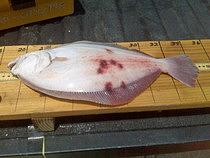BP’s corexit causes sick fish in Gulf of Mexico
Over a year after the largest oil catastrophe in U.S. history, in a CBS News
"I don't think we'll be fishing in five years," Lucky Russell, a commercial fisherman told Bell. Many fishermen are catching fish with sores, fin rot, and infections at a greater frequency than ever before.
"When one of these things comes on deck, it's sort of horrifying," said Jim Cowan, professor of oceanography at Louisiana State University, has analyzed many of these diseased fish.
"I mean, there these large dark lesions and eroded fins and areas on the body where scales have been removed. I'd imagine I've seen 30 or 40,000 red snapper in my career, and I've never seen anything like this. At all. Ever."?
We think from chronic exposure to some environmental stressor, and I think the likely assumption that it has something to do with the spill is there," Cowan told Bell.
“The highest rate of sick fish are being found in the areas of the Gulf that were the most affected by oil and Corexit, the deadly dispersant sprayed throughout the area according to Cowan. This whole issue seems to be centered between Galveston and Panama City."
"In fact, almost 50 percent of the red snapper that we caught on some of these reefs had had these secondary infections."?
In early January, scientists released a report on results of testing Louisiana seafood that confirmed the present dangerous human health situation, especially to children, not just in the Gulf region but throughout the nation, as reported by other doctors such as Dr. Rodney Soto.
The report by Wilma Subra, the seasoned Louisiana environmentalist featured in Sophie McNeill's special
SBS TV program, Dateline, in Australia, was entitled, "Results of sampling performed by the Lower Mississippi River Keeper from Atchafalaya Bay eastward to the Louisiana/Mississippi state line, in the Gulf of Mexico coastal areas of Louisiana."As this author has highlighted, in advocating for Peoples of the Gulf, Dr. Soto states, "Children are very susceptible, or I would say more susceptible, to the effects of the petroleum derivatives, because of their liver detox capability is less than an adult."
"Their brain is also developing, and their immune system is developing. So they’re gonna be affected several-fold more than an adult who is being exposed to the same amount of toxin."
Read more?
Internet site reference
'Horrifying' Gulf fish lesions, fin rot, infections: Scientists, fishermen - National Human RightsComments
There are 0 comments on this post













